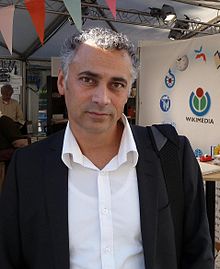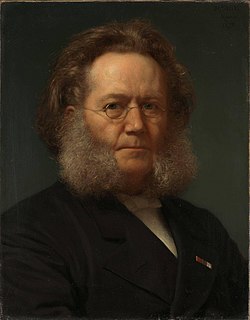
Henrik Johan Ibsen was a Norwegian playwright and theatre director. As one of the founders of modernism in theatre, Ibsen is often referred to as "the father of realism" and one of the most influential playwrights of his time. His major works include Brand, Peer Gynt, An Enemy of the People, Emperor and Galilean, A Doll's House, Hedda Gabler, Ghosts, The Wild Duck, When We Dead Awaken, Rosmersholm, and The Master Builder. Ibsen is the most frequently performed dramatist in the world after Shakespeare, and A Doll's House was the world's most performed play in 2006.

Ivo Caprino was a Norwegian film director and writer, best known for his puppet films. His most noted film, Flåklypa Grand Prix, was made in 1975.

Kjell Aukrust was a Norwegian author, poet, artist and humorist. Aukrust is principally known for his Flåklypa stories and Flåklypa drawings.

Johan Bernhard Hjort was a Norwegian supreme court lawyer. Having joined the law firm of Harald Nørregaard in 1932, he continued the firm after World War II as Advokatfirmaet Hjort, which today is one of Norway's leading law firms. Hjort was also noted for his involvement with the fascist party, Nasjonal Samling, in the 1930s, but left the party in 1937 and became an active member of the anti-Nazi resistance during World War II. He was imprisoned by the Nazis and is credited with saving the lives of many prisoners through his involvement with the White Buses. After World War II, he rose to become one of Norway's preeminent lawyers, and was noted for his defence of gay rights and controversial artists, as chairman of the Riksmålsforbundet language society, and as a liberal public figure.
The Norwegian Academy for Language and Literature, commonly known as the Norwegian Academy, is a Norwegian learned body on matters pertaining to the modern Norwegian language in its Dano-Norwegian variety, now commonly known as Riksmål and Bokmål. The academy was established in the Norwegian government's honorary residence Grotten in 1953 based on the model of the Swedish Academy and the French Academy, but the idea was originally conceived by Bjørn Bjørnson in 1913. Its members are elected for life on the basis of scholarly, literary or artistic merits. The academy publishes the main dictionary of Norwegian, Det Norske Akademis ordbok, is responsible for regulating the written standard known as Riksmål and has a literary and cultural purpose. The academy awards the Norwegian Academy Prize in memory of Thorleif Dahl.
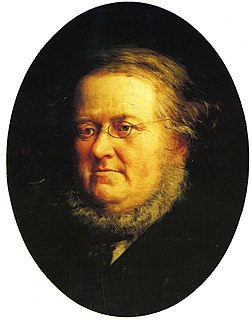
Peter Christen Asbjørnsen was a Norwegian writer and scholar. He and Jørgen Engebretsen Moe were collectors of Norwegian folklore. They were so closely united in their lives' work that their folk tale collections are commonly mentioned only as "Asbjørnsen and Moe".

Thorbjørn Egner was a Norwegian playwright, songwriter and illustrator known principally for his books, plays and musicals for children. He is principally associated with his narratives for children including Karius og Baktus (1949) and Folk og røvere i Kardemomme by (1955).
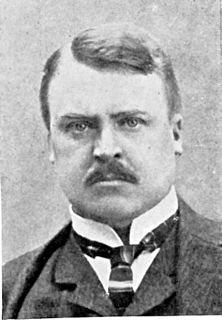
Johan Hjort was a Norwegian fisheries scientist, marine zoologist, and oceanographer. He was among the most prominent and influential marine zoologists of his time.
Events in the year 1966 in Norway.
The Netherlands was represented by duo Maxine and Franklin Brown, with the song "De eerste keer", at the 1996 Eurovision Song Contest, which took place in Oslo on 18 May.
Finn Havrevold was a Norwegian novelist, short story writer, children's writer, playwright, illustrator and theatre critic.
Lom prisoner of war camp was a facility used by the Norwegian 2nd Division to hold German prisoners-of-war during the 1940 Norwegian Campaign of the Second World War. The camp, which operated from 20 to 27 April 1940, also held Norwegians accused of collaborating with the Germans or the Norwegians fascists led by Vidkun Quisling.
Erik Røring Møinichen Lie was a Norwegian writer.
Fredrikstad bys historie is a six-volume book series on the history of the Norwegian town Fredrikstad. The first five volumes were written by Martin Dehli, whilst the sixth was written by Ivo de Figueiredo.
Peter Fredrik Holst Hjort was a Norwegian professor of medicine and politician for the Labour Party. He is best known for his work to establish the University of Tromsø, and for his work with public health.
Martin Ivo Fredrik Carl Cramér was a Swedish dancer, choreographer, ballet director and director. He was the son of Carl-Rudolf Cramér and the nephew of Harald Cramér and married to Tyyne Talvo Cramér.

Harald Nørregaard was a Norwegian supreme court advocate (høyesterettsadvokat), i.e. a lawyer with the right to appear before the Supreme Court of Norway. He founded the law firm now known as Advokatfirmaet Hjort in 1893 in Christiania, and was Chairman of the Norwegian Bar Association from 1904 to 1907. He was also one of Edvard Munch's closest friends since adolescence, adviser and lawyer. He owned several of Munch's most famous paintings. He was married to Aase Nørregaard née Carlsen (1869–1908), a painter and a close friend of Munch, and secondly to Marit Liv Nørregaard née Tillier (1885–1981), who was also a painter. Munch made several paintings and drawings portraying Nørregaard and his two wives.

Hjort is a law firm in Norway, headquartered in Oslo. It was founded in 1893 by Harald Nørregaard (1864–1938), a supreme court advocate who was also chairman of the Norwegian Bar Association and Edvard Munch's close friend, adviser and lawyer.

Lêdo Ivo was a Brazilian poet, novelist, essayist and journalist. He was member of the Brazilian Academy of Letters, elected in 1986.
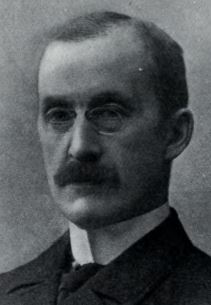
Peter Fredrik Holst was a Norwegian physician, a professor of internal medicine and specialist in bacteriology and cardiology. He is probably best remembered for his contributions to a widely used textbook in internal medicine.
